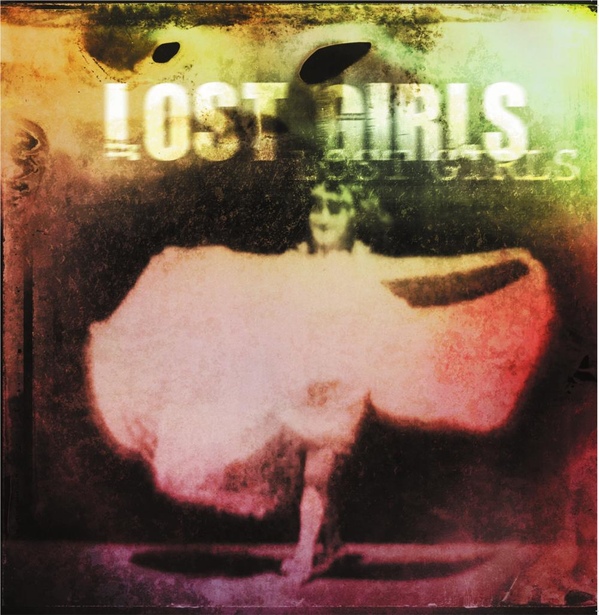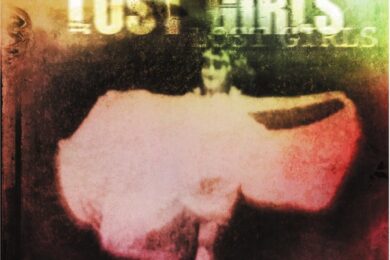In November of last year, the estimable 3 Loop Music label released Lost Girls, a two-CD compilation of late 1990s recordings named after a group founded and focused around the talents of Patrick Fitzgerald, famed for leading the Kitchens Of Distinction, and Heidi Berry, who had previously released a series of intriguing albums on Creation and 4AD as well as appearing on the latter’s free-floating This Mortal Coil project. Fleshed out for various live shows and recordings with other performers, including fellow Creation/Heavenly veteran Dave Morgan on drums, Lost Girls only ever self-released one single, ‘Needle’s Eye’, in 1998, so hearing both the intended full album and a variety of other recordings is an enjoyable retrospective treat. Often more roughly rocking out than much of Berry’s solo work, while not as epically dreamy as the Kitchens, it offers its own blend of two distinct voices and more, with striking songs like ‘Hovercrafts’ and ‘Hold Me Down’ among the standouts.
In September, Fitzgerald and Berry took the time to answer a few questions about their Lost Girls work. Fitzgerald continues with his solo Stephen Hero project as well as the return of the Kitchens with 2013’s wonderful album Folly, while Berry currently teaches at the Brighton Institute of Modern Music.
Had either of you done anything quite like this before in terms of (I presume) equal collaboration, where both of you were songwriters and singers?
Patrick Fitzgerald: No. I’d made my first solo record as Fruit in 1995 and had lots of people contributing, but not writing.
Heidi Berry: For me, yes. I had co-written two songs that came out on my 4AD records with my bass player, Laurence O’Keefe (ex-Levitation) but that had a different dynamic, where Laurence gave me a couple of bass riffs and I built songs around them.
Building on the previous question, how easy – or not – was the collaborative process? Did it start with the same person each time, did it flow both ways, were there various different paths towards a similar goal?
PF: We actually only wrote one or two songs together, and I think we could have done more of that. But it requires a confidence I may not have had at the time. We tended to have finished songs to bring to the project, and then I’d get on with the studio stuff, searching out loops and samples to bring a different colour to it. This is more apparent on the duo recordings. We kept it equal, having the same number of songs in the bag. And Heidi was with me in the studio helping with decisions around sounds and instrumentation. The main learning experience for me was harmony work – watching Heidi, Ash [Wood, guitarist] and Kim [Smith, bassist] working out three and four-part harmonies was work I’d never done before. Very inspiring.
HB: I can’t really add to what Patrick has said here. Except I have him to thank for helping me develop my piano skills – his playing was what inspired me to learn how to play properly. He also encouraged me to play the acoustic piano on the track ‘Japanese’ – I wasn’t confident I could do it, but he gave me the courage. I write most of my songs on piano now.
Did a sense of expectation based on your previous separate work colour perceptions of how what you did was received, whether live or in your efforts to secure a formal release?
PF: It must have done even though both of us were trying to escape from that! I really wanted to do something different from Kitchens, and I’m pretty sure Heidi was sick of being bracketed in a folksy category when clearly she delved into much stranger musical worlds.
HB: I think we must have confounded any preconceptions that were around. I absolutely wanted to get away from girl/folk stereotyping, which so isn’t me. I think we were both pretty open and didn’t have any expectations.
Was there a specific goal you hoped to achieve as performers that didn’t happen in the end beyond a formal full-length release?
PF: The goal at the start was just to get work done so we could start feeling like writers/musicians again. We’d both been through fairly bruising experiences. I wasn’t sure where it would go, and didn’t really mind. It was a lot of fun doing it. And I thought the music was great. The problem at the end was that there was a stalling which required more momentum to push through than I had. I got sick with my first kidney illness, and got tired and scared. I not only left Lost Girls but I also left London and the UK – I moved to rural Ireland to give up smoking and drinking and figure out what it was I wanted to do with my life.
HB: We just wanted to be making music. I have always been more into the art than the industry, so when it seemed it just wasn’t going to happen for Lost Girls, I hadn’t the heart to hammer on with it. I had no hard feelings when Patrick had to leave London. I got it.
What remains for you the most intriguing surprise of the work together, and what has had the longest term impact on your creative work from that time, if any one thing in particular?
PF: It’s consistency. Two fairly distinct performers making good work together. Our voices I felt complimented each other – sandpaper and silk! These recordings have been sitting around for a long time and each time I play them it surprises me how much I like them, how good I think the songs and singing sound. It deserves a hearing, and that’s quite surprising after all these years.
HB: For me, Lost Girls isn’t really an album – it’s a diary. When Patrick first put forward the idea of a Lost Girls release, I was a bit nervous. I put off listening to the songs for a bit, but when I did – I was surprised at how fresh and full of life they sound. I hear a few lumps and bumps in the demos – things we would have resolved if we had continued with the project. But you can’t go back and edit a diary. And in the end, we made something lovely and I’m proud of it.
Lost Girls is out now via 3 Loop Music



